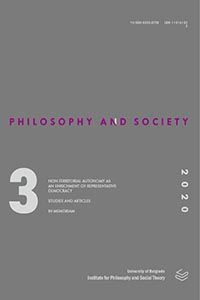Karl Renner’s theory of national autonomy
Karl Renner’s theory of national autonomy
Author(s): Xabier ArzozSubject(s): Politics / Political Sciences, Politics, Social Sciences, Geography, Regional studies, Political Theory, Political Sciences, Civil Society
Published by: Institut za filozofiju i društvenu teoriju
Keywords: national autonomy; Austria-Hungary; minority rights; federalism; multinational state; principle of personality; territorial autonomy; nation; self- determination; majority rule;
Summary/Abstract: Karl Renner’s theory of national autonomy has not been sufficiently taken into account by scholars due to difficulties in its reception and puzzling content. Neither liberal nor communitarian, his original theory combines individual rights with collective rights, territorial autonomy with personal autonomy, classical federalism with establishment of nations as constituent parts of the state. This paper will introduce the reader to Renner’s main concepts. It will start by presenting Renner’s ideas on the nation, the multinational state, the role of the majority principle, and the need for nations’ legal recognition by and within the state. Then, Renner’s core notion of national autonomy and its organisation through the personality principle will be discussed. Further, the paper deals with Renner’s concept of the representation of national interests at the federal or supranational levels. Lastly, it sums up the discussion and draws conclusions regarding Renner’s theory of autonomy in general.
Journal: Filozofija i društvo
- Issue Year: 31/2020
- Issue No: 3
- Page Range: 301-318
- Page Count: 18
- Language: English

